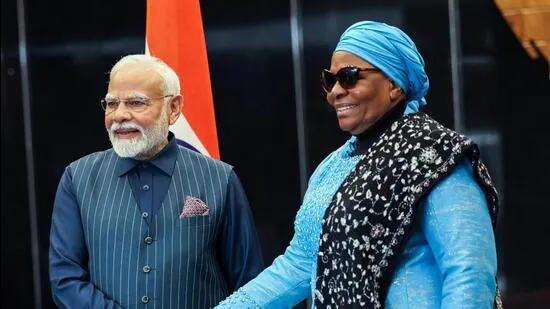Namibia Embraces India’s UPI Model: A New Era of Digital Payments in Africa
- MGMMTeam

- Jul 10, 2025
- 4 min read
Introduction: A Historic Leap in Fintech Diplomacy
In a significant step toward strengthening its digital infrastructure, Namibia is set to become the first African nation to adopt a real-time digital payments system modeled on India’s Unified Payments Interface (UPI). This development comes as part of a broader vision by the Indian government to export its homegrown digital public infrastructure to countries in the Global South, empowering them with efficient, scalable, and inclusive technology.

The announcement was made during Prime Minister Narendra Modi’s official visit to Namibia, where he met with Namibian President Netumbo Nandi-Ndaitwah. Among the wide-ranging agreements and discussions, the rollout of the UPI-based system stood out as a landmark decision aimed at deepening India-Namibia cooperation in fintech and beyond.
UPI Comes to Africa: The Agreement Between India and Namibia
In April 2024, NPCI International Payments Limited (NIPL), a subsidiary of the National Payments Corporation of India, signed a licensing agreement with the Bank of Namibia to implement the UPI framework in the southern African country. Under this agreement, Namibia will design and operate its own digital payment system based on the UPI model, with technical support and guidance from NIPL. The system is expected to go live by September 2025.
This partnership reflects India’s growing stature as a global digital leader. While many developing nations struggle with outdated banking systems, India’s UPI has emerged as a benchmark for financial inclusion and real-time, low-cost transactions. Namibia’s adoption of this model not only signals a technological upgrade but also a strategic alignment with India’s digital philosophy.
Strengthening Economic and Strategic Ties
The UPI initiative is just one part of the broader India-Namibia relationship that has evolved rapidly in recent years. Bilateral trade has grown exponentially—from under $3 million in 2000 to nearly $600 million today. Indian investments in Namibia span across mining, diamonds, energy, agriculture, and pharmaceuticals. Indian companies have also been actively involved in skills development, healthcare, and small business initiatives within Namibia.
During Prime Minister Modi’s visit, both countries signed multiple Memorandums of Understanding (MoUs), including agreements on entrepreneurship development and public health. Modiji also proposed deeper collaboration in the fields of education, agriculture, digital security, women and child welfare, and environmental sustainability. These partnerships, reinforced by shared values and mutual respect, are contributing to a resilient and forward-looking South-South cooperation model.
Namibia’s Vision: Financial Inclusion and Sovereignty
Namibia’s decision to build a UPI-like system reflects its vision to modernize its financial sector and promote inclusive growth. Currently, access to formal financial services remains limited in many parts of the country, particularly in rural and underbanked areas. A real-time payment system like UPI has the potential to revolutionize everyday transactions, allowing small businesses, farmers, and individuals to send and receive money instantly using mobile devices.
Unlike outsourced fintech solutions offered by global corporations, this model ensures Namibia’s digital sovereignty. By licensing UPI’s architecture and building a locally owned platform, Namibia can retain full control over its regulatory framework, data privacy, and technical standards, while benefiting from India’s tested and trusted infrastructure.
India’s UPI Diplomacy: A Global Tech Template
India’s vision of digital diplomacy has rapidly expanded through the success of UPI. The platform, introduced in 2016, has become the backbone of digital payments in India—processing nearly 18 billion transactions monthly and projected to hit 1 billion daily transactions within a few years. Encouraged by this domestic success, NPCI International has been actively partnering with countries across Latin America, Southeast Asia, and Africa.
Besides Namibia, India has signed agreements with countries like Peru and Trinidad & Tobago, and is in talks with several others, including Nigeria, Ghana, and Rwanda. The aim is to build a global interoperable digital payment ecosystem, enabling seamless cross-border transactions and empowering developing economies with proven technology.
A Step Toward the Global South’s Digital Empowerment
The launch of UPI in Namibia is more than just a fintech story—it’s a symbol of shifting global dynamics. As developing nations seek alternatives to traditional Western-led financial systems, India’s digital platforms offer cost-effective, secure, and inclusive models that resonate deeply with the needs of the Global South.
India’s willingness to share its digital public infrastructure not for profit but for partnership marks a transformative moment in international cooperation. It offers an alternative vision of globalization—one where technology serves people, not just profits.
Conclusion: A Digital Bridge Between India and Africa
Namibia’s embrace of India’s UPI system sets the stage for a new chapter in Afro-Asian cooperation. It embodies trust, technological collaboration, and a shared commitment to inclusive development. As this payment system takes root in Namibia, it has the potential to empower millions, unlock new economic opportunities, and strengthen South-South solidarity.
For India, this success strengthens its identity as not just a technology powerhouse but a responsible digital leader. For Namibia, it marks a bold step toward becoming a modern, resilient, and financially inclusive nation. And for the world, it offers a glimpse into the future of collaborative development driven by innovation and mutual respect.
(Sources: Hindustan Times, The Indian Express, Economic Times)




Comments